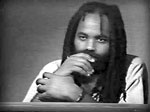From Mumia Abu-Jamal on death row
The forgotten ones: Katrina
Published Mar 10, 2006 11:42 PM
Amidst the blizzard of congressional, bureaucratic, and
administrative reports on Hurricane Katrina, the only thing left out is what was
left out from the very first day and every single day thereafter— the
people.
It has been six months after the nation’s worst natural (and
political) disaster and still, things are as unstable, as unsure, as chaotic for
the tens of thousands of people who were too poor to leave during the night of
the catastrophe.
While politicians fight over air time and report after
report is issued, the mostly Black residents of the city (especially those who
dwelled in the Lower Ninth Ward) are spread across the country, fighting FEMA
for housing funds, seeking jobs, trying to put their lives
together.
Meanwhile, corporate and city planning agencies are writing off
vast areas of the Ninth Ward, and planning for a “new” New Orleans,
one that will be, shall we say, a good deal less chocolate.
Many former
residents are crunched into tiny hotel rooms, some are squeezed into private
homes, some are even homeless, while 100,000 trailers acquired by FEMA stand
idle, empty, unused.
It is a telling measure of social and class
difference, that when so many people are living in such distress, the white
corporate media goes into a silly cycle because the city’s mayor told a
group of Katrina survivors that New Orleans would be a “chocolate
city” again.
A recent study on the future of New Orleans suggests
that the “new” New Orleans will be whiter, and wealthier than the
city which was struck by the winds and waters of Katrina.
The study, headed
by John R. Logan, entitled “The Impact of Katrina: Race and Class in
Storm-Damaged Neighborhoods” (www.s4.brown.edu/Katrina/report.pdf),
shows how 80 percent of Black New Orleanians may never return. Indeed, nearly 50
percent of white working-class residents may not return either.
Logan, a
sociology professor at Brown Univer sity, reports that local and state political
and business leaders are looking to make sure that New Orleans has a new
constituency—one whiter and wealthier than those who came
before.
Remember the high and lofty promises that were spit into
microphones when Katrina was still news? Words, blather, promises. There’s
another reason why monies promised have never really reached the Crescent
City—war. The Iraq War is like a fiscal vacuum cleaner, sucking up every
buck not nailed down.
Hurricane Katrina has also spawned another,
little-discussed problem: the profound toxicity that abounds in the region,
where lead, arsenic, crude oil, benzene, and dozens of other substances have
leached into the earth, into brick, and into the tropical air.
One is
reminded of the 9/11 attacks, when city and federal officials assured residents
that the wafting white dust wasn’t a health danger to those breathing in
Manhattan. Now, years later, we know that these were lies designed to give false
peace to people in peril.
Katrina, although on the back burners of most
news agencies, lives in the minds of millions as the worst of America when it
involves Blacks in distress.
Recently, an African activist living in Paris
told how, when questioned about the recent riots in France, he turned the
tables. As Brima Conteh explained:
“We had a couple of African
Americans
who wanted to come over to see us during the riots, and the first
question we asked them was, ‘We want to know what you’re doing about
Katrina.’
“Even in France, people say, look the U.S. this and
that—the U.S. is seen on a different level despite the racism. But people
started asking questions, if you have these big Black American stars, what the
hell is happening over there?” [From: Tram Nguyen, “Lessons From
France: African Activist Brima Conteh Talks About the Roots and Reverberations
of the Unrest in Paris,” *Colorlines* Magazine (Spring 2006), p.
9]
The images of Katrina have not faded. They echo around the earth,
bouncing off satellites, teaching, telling, revealing. In the very beginning the
images told us that this nation, the richest since Rome, didn’t really
give a damn about Black poor people. It has been half a year, and that message
resonates today just as clearly as it did yesterday.
Articles copyright 1995-2012 Workers World.
Verbatim copying and distribution of this entire article is permitted in any medium without royalty provided this notice is preserved.
Workers World, 55 W. 17 St., NY, NY 10011
Email:
[email protected]
Subscribe
[email protected]
Support independent news
DONATE


